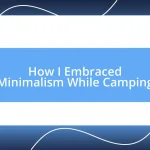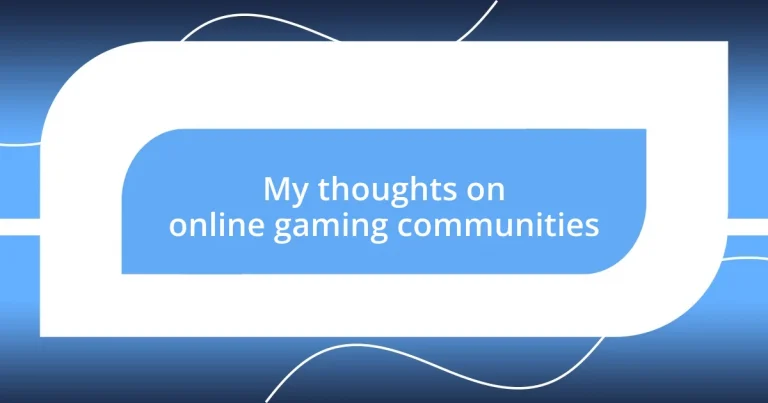Key takeaways:
- Online gaming communities foster relationships and provide a sense of belonging, enhancing the overall gaming experience through shared strategies and support.
- Community types vary from casual play to competitive clans, each creating unique dynamics and atmospheres that impact gamer interactions and relationships.
- Managing toxicity and promoting positive engagement are essential for cultivating a healthy community, with practices like inclusivity and active participation significantly improving social dynamics.
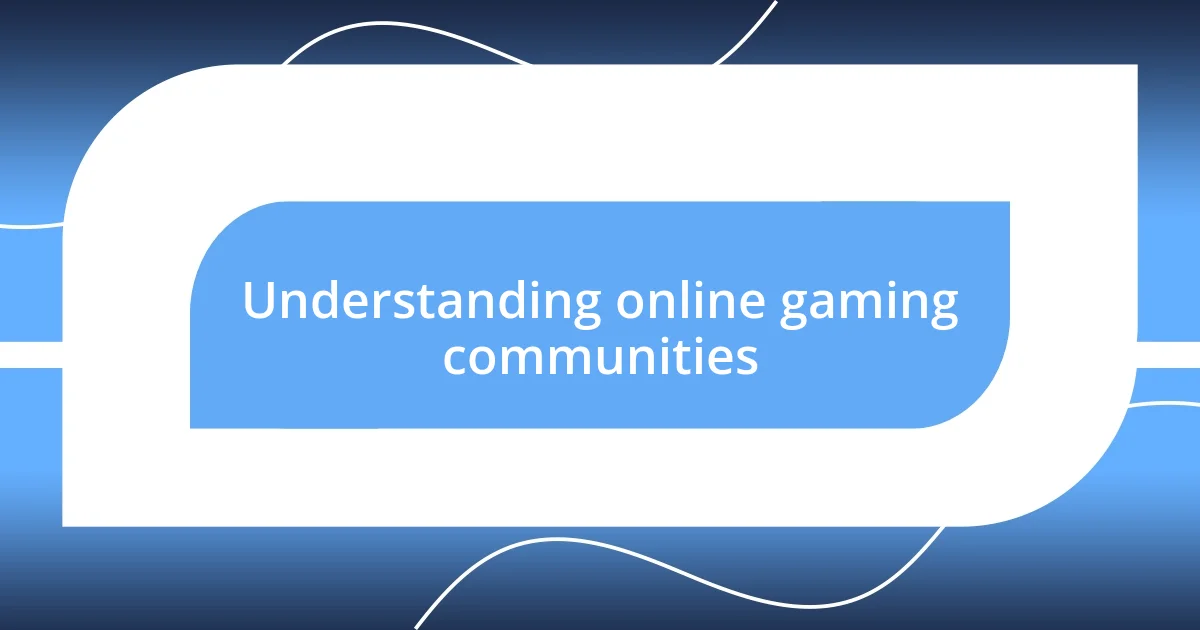
Understanding online gaming communities
Online gaming communities are fascinating arenas where players from diverse backgrounds come together, fueled by a shared passion for gaming. I remember my first experience joining a community; it was like stepping into a new world where everyone spoke the same language. The thrill of finding like-minded individuals was incredible, and it made me realize how powerful these communities can be in building friendships and support systems.
Each community holds its own culture, shaped by the games they embrace and the values they prioritize. It’s interesting to reflect on how some groups foster an environment of inclusivity and cooperation, while others may cultivate fierce competition. Do you ever feel a sense of belonging to a group that resonates with your gaming style? I often find myself drawn to those spaces where respect and collaboration reign, as they enhance the gaming experience beyond just winning or losing.
Yet, not all interactions in gaming communities are positive. I’ve encountered my share of negativity and toxicity, which can cloud the joy of gaming. These experiences underscore the need for community guidelines and moderation; without them, how can we expect to nurture a healthy environment where everyone feels welcome? It’s a complex dynamic, but one that deeply impacts how we connect, play, and grow as gamers.
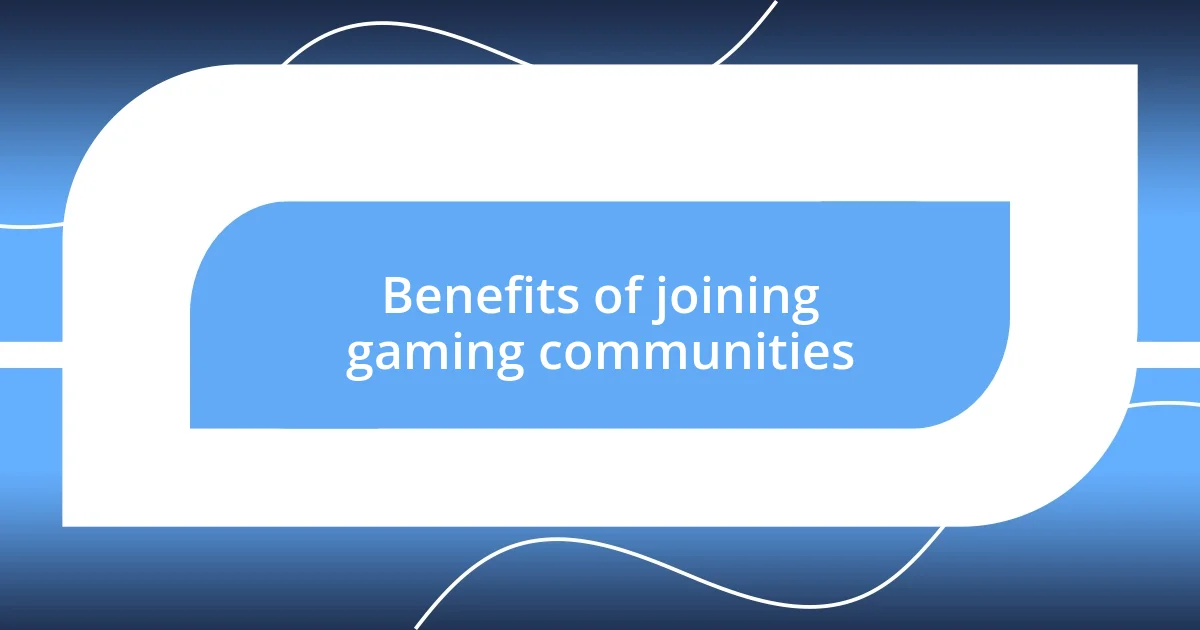
Benefits of joining gaming communities
Joining gaming communities offers a plethora of benefits that truly enhance the gaming experience. For instance, I recall joining my first clan in an online shooter game. The camaraderie was palpable; we shared strategies, celebrated victories together, and even supported one another during tough losses. This sense of belonging was invaluable, turning casual gaming into a rich social experience.
Moreover, being part of these communities can significantly improve your gaming skills. I learned so much from watching experienced players and receiving constructive feedback from peers. It’s like having an all-access pass to a treasure trove of knowledge that you wouldn’t typically find on your own. Whether it’s through advice on character builds or techniques to enhance gameplay, being surrounded by dedicated gamers can truly elevate one’s performance.
Of course, the networking opportunities can’t be overlooked. I’ve met people from around the globe, forming connections that extend beyond gaming. Some of these friendships have even led to real-life meetups, transforming virtual avatars into cherished companions. These experiences remind me that the potential friendships and collaborative ventures are just as rewarding as the games themselves.
| Benefits | Personal Experience |
|---|---|
| Sense of Belonging | Found a supportive clan that celebrated our collective wins. |
| Skill Improvement | Gained insights and strategies from skilled players that advanced my gameplay. |
| Networking Opportunities | Built friendships that extended beyond the gaming world into real life. |
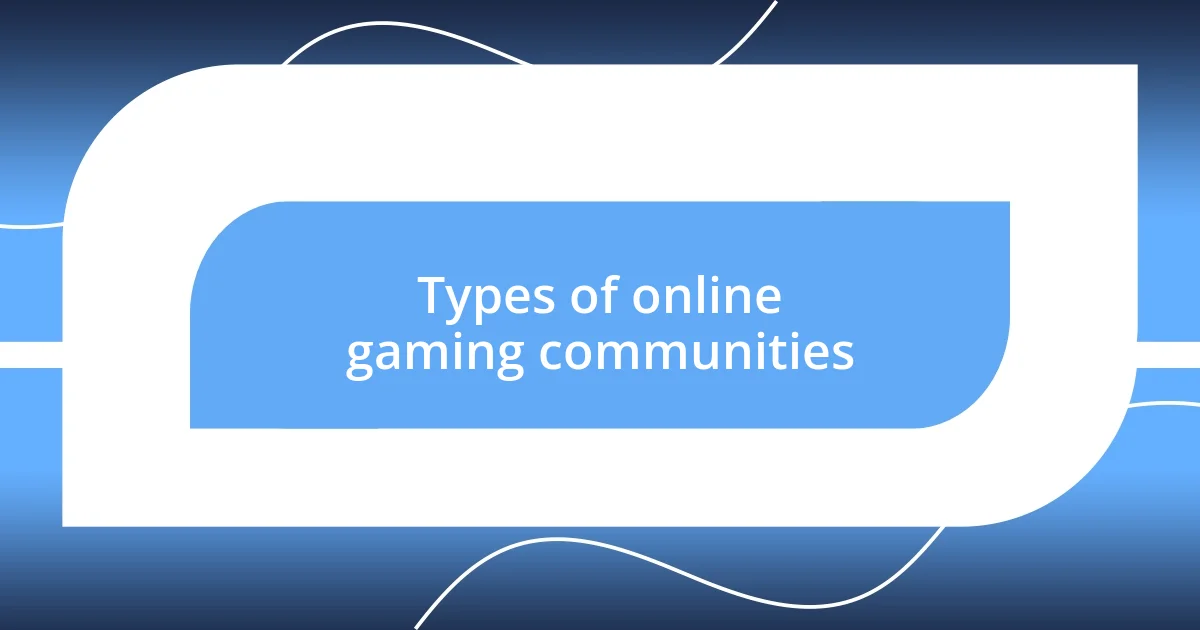
Types of online gaming communities
Online gaming communities can be classified into several types, each offering unique experiences and interactions. Personally, I’ve found myself navigating various community styles, including casual gaming groups and competitive clans. Each type certainly comes with its own dynamics, and the atmosphere can vary dramatically depending on the members and their shared goals.
Here’s a quick overview of the different types of online gaming communities:
- Casual Play Communities: Focused on relaxed gaming with friends, these communities highlight enjoyment over competition.
- Competitive Clans: Often structured with ranks and goals, they thrive on winning and skill development, pushing players to improve.
- Role-Playing Communities (RPGs): Centers around immersive storytelling and character development, full of collaboration and creativity.
- Modding Communities: Specialize in game modification, where fans create and share user-generated content, enhancing game longevity and engagement.
- Streaming and E-sports Communities: Built around streaming platforms, they cultivate an audience for live gameplay and competitive matches, making shareable experiences central.
Throughout my journey, I recall the spirited discussions in a casual group I joined while playing an MMORPG. We often engaged in light-hearted banter, exploring new quests together without the pressure to perform. In contrast, my experience with a competitive clan felt like joining a well-oiled machine; the stakes were higher, yet the camaraderie was equally intense. The mix of excitement and adrenaline before matches was electric, and it cultivated a sense of teamwork that I hadn’t expected.
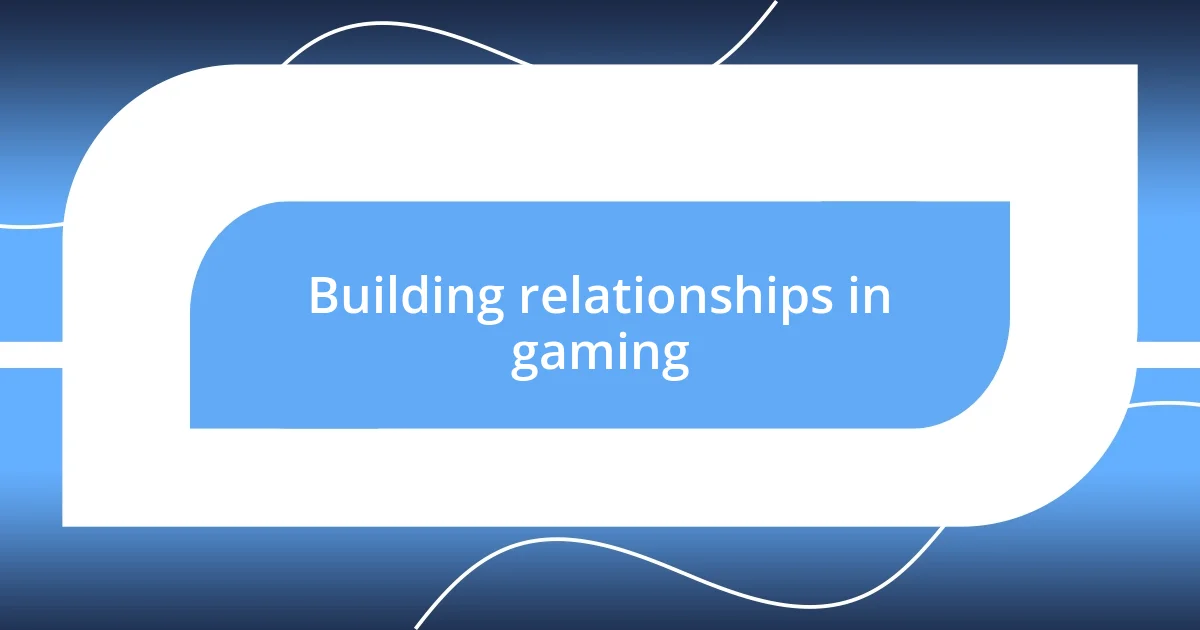
Building relationships in gaming
Building relationships in gaming often goes beyond just playing together; it’s about creating lasting connections. I remember the first time a fellow gamer reached out to me in a cooperative game. We weren’t just teammates; we became friends who shared laughs and challenges, forging a bond that made every session incredibly rewarding. Have you ever experienced that moment when a simple victory felt like a shared triumph that brought you closer to someone else? It’s moments like these that transform the gaming experience.
Engagement in gaming communities frequently opens the door to deeper relationships. I once participated in a game where the group organized a weekly game night. Every Friday, we would gather online, sharing our highs and lows from the week alongside our in-game exploits. This became more than just a routine; it allowed us to connect on personal levels, sharing life stories between matches. It’s fascinating to think how a shared virtual space can lead to genuine friendships in the real world, isn’t it?
The emotional connections we build within these gaming circles can be profoundly impactful. I recall the encouragement I received from my team after a particularly tough match. We rallied around each other, discussing not just strategies, but also our real-life challenges, creating a sense of understanding that enhanced our gaming experience. It made me realize that these online interactions can fulfill a need for companionship and support, showing that friendships formed in the digital realm can be just as meaningful as those made face-to-face.
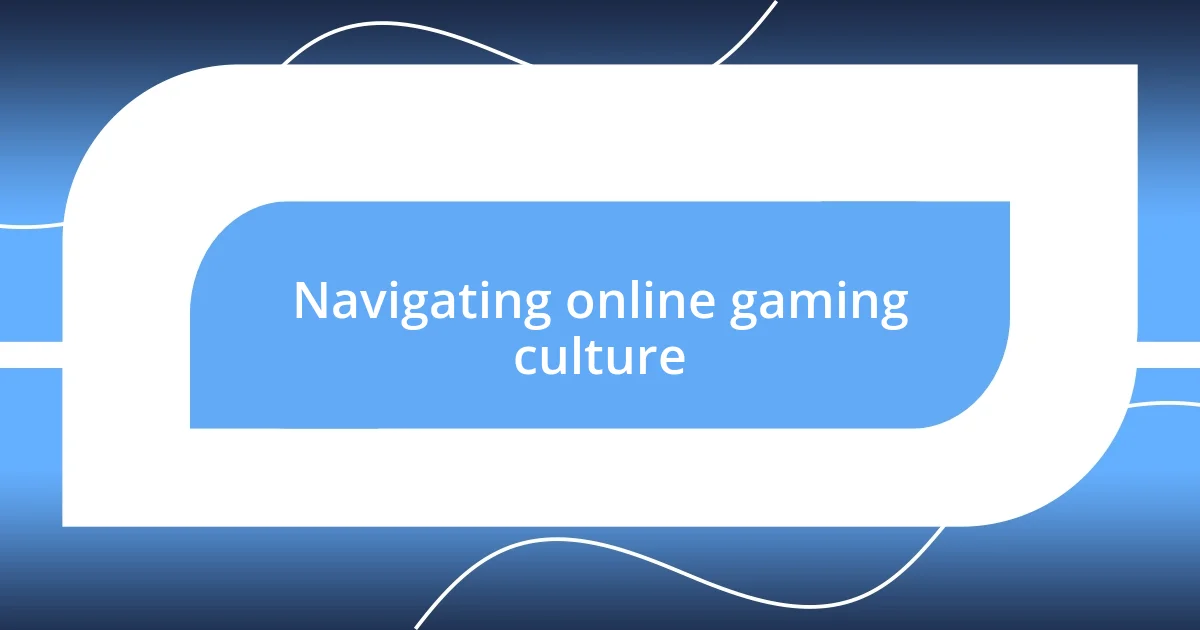
Navigating online gaming culture
Navigating online gaming culture requires a delicate balance between immersing oneself in the game and understanding the social dynamics at play. I remember joining a new game where I felt like a fish out of water at first. The inside jokes and references flew over my head, but as I started to pick up on the nuances, it transformed the experience. Have you ever felt lost in a community and wondered how everyone seems to be on the same wavelength? It’s part of the fun—getting to know the culture and finding your place within it.
Engaging in online gaming communities can sometimes feel like walking a tightrope. In one instance, I joined a competitive clan and quickly realized the pressure to perform was intense. While the competitive spirit pushed us to improve, the highs and lows of gameplay often mirrored our emotional states, creating a bond through shared experiences. Have you ever experienced that rush of adrenaline before a crucial match, knowing that your team is counting on you? That connection isn’t just about the game; it’s about understanding your teammates’ motivations and pressures, which deepens the friendship.
Moreover, the language of gaming culture can be unique, filled with memes and references that might leave newcomers dizzy. I once jumped into a chat and felt overwhelmed by the jargon. It’s a bit like entering a foreign country without knowing the local tongue, isn’t it? But as I engaged and asked questions, I found that most gamers were more than willing to share their knowledge. This openness created a welcoming atmosphere that made the culture feel more accessible. It’s moments like these that show how the gaming community continuously evolves, inviting newcomers to join the fray.
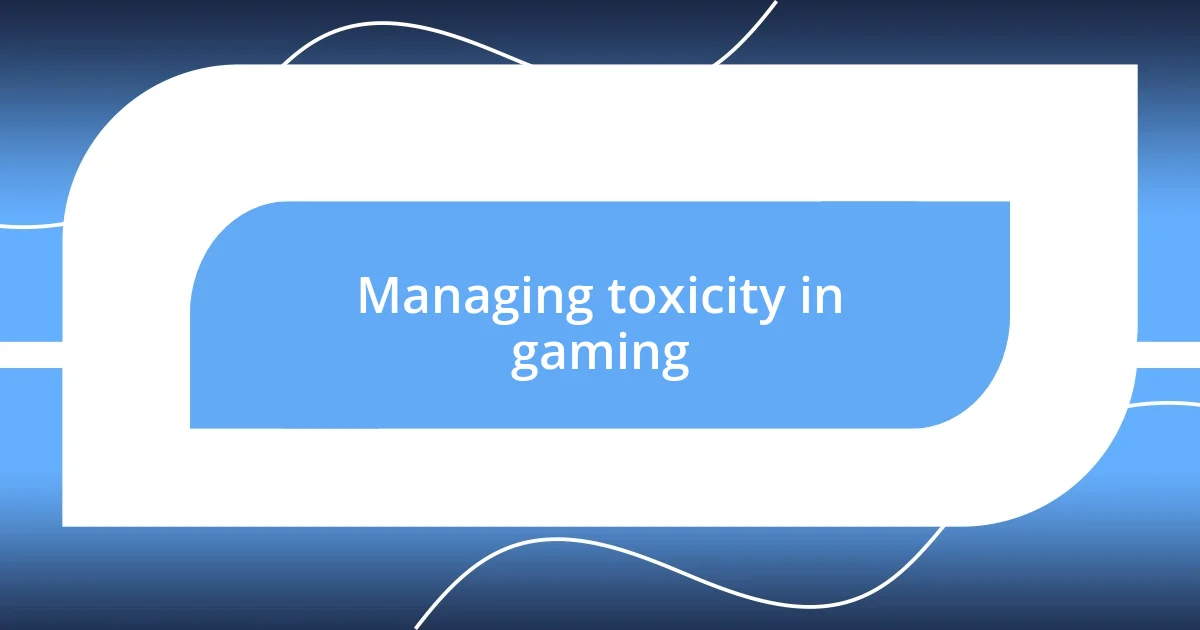
Managing toxicity in gaming
Managing toxicity in gaming is a challenge I’ve grappled with firsthand. There was a time in a multiplayer game where toxic behavior started to overshadow the fun. I remember playing with a group, and after a few matches, negativity began to creep in. Comments about poor performance or rude remarks were flying around like arrows. It made me wonder—how can something meant for enjoyment turn so sour?
In my experience, addressing toxicity is often about creating a supportive environment. I joined a community that implemented strict guidelines against abusive behavior. At first, I was skeptical; could such measures really change the vibe? But to my surprise, it did! As we collectively addressed negative comments and reinforced positive interactions, it fostered a camaraderie that made gaming more enjoyable for everyone. Have you ever felt the weight lift when negativity was replaced by encouragement? It was a game-changer for our team dynamics.
Finding ways to manage toxicity can also come from individual actions. I made it a point to uplift others in my gaming sessions, even when things weren’t going well. A simple “You got this!” or “Let’s try again together!” often shifted the atmosphere from frustration to motivation. I’ve noticed that positivity is contagious. So, when faced with negativity, I now ask myself—how can I turn this around? Choosing to focus on support instead of resentment has greatly enriched my gaming experiences, making every session not just a challenge, but also a chance to build each other up.
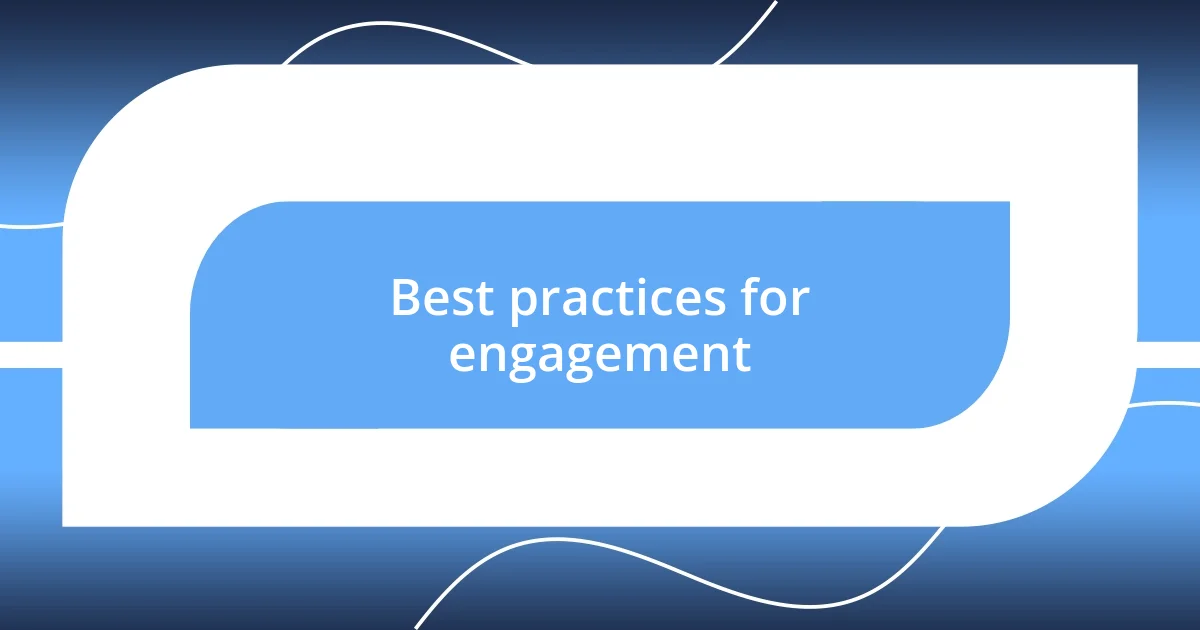
Best practices for engagement
Engaging effectively in online gaming communities starts with active participation. I’ve often shared my thoughts and strategies in in-game chats or forums, and the response has been overwhelmingly positive. Have you ever experienced the satisfaction of helping someone else improve their gameplay? Taking the time to offer tips or celebrate others’ successes not only strengthens connections, but it also creates an atmosphere where everyone feels valued and heard.
Another best practice is to show genuine interest in fellow players. Once, during an intense match, I paused to ask a teammate about their favorite game genre. To my surprise, this simple question opened the door to a rich discussion that lasted beyond the game. I’ve found that engaging in conversations about personal experiences or game lore not only enhances camaraderie but can also turn casual players into friends. It’s amazing how a little curiosity can foster deeper connections, don’t you think?
Lastly, I believe in the power of inclusive events. Organizing tournaments or community game nights can spark excitement and draw players together. I once took part in a friendly competition that started out as a small gathering but grew into a massive event brimming with energy and enthusiasm. Seeing everyone share in the joy of gaming, regardless of skill level, reinforced the idea that inclusivity breeds engagement. Have you ever witnessed the joy of a community coming together? That collective spirit is what makes online gaming truly rewarding.
